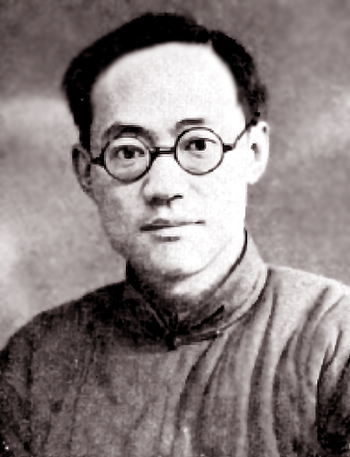
But this two-part post isn’t about Ba Jin’s days as a young socialist crusader and novelist. Ba Jin lived to be 100 years old – he passed away in 2005. And though he was ill with Parkinson’s for the last decades of his life, he was still writing well into the 1980s.
The late 80s were a rough time for China ideologically. The country had just flip-flopped from hard-core Cultural Revolution-era Communism to a budding market economy in just 10 years. Social values were turned on their head, and all the things that were so important in the 1970s – the Party, the Motherland, the socialist struggle – were devalued. Suddenly, what mattered most was making enough money to survive.
In 1987, Ba Jin received a letter from 10 elementary school students confused by the mixed messages they felt society was sending them. What’s more important: money or ideals? Their letter, which I translate below, is striking… though I have a hard time imagining a bunch of ten-year-olds deciding to convene a committee to draft a plea for moral guidance, so I’m kind of convinced one kid’s dad wrote this thing and made them all sign it.
Anyway, Ba Jin’s reply, which I’ll translate in a Part II sometime soon, is much longer. Taken together, these two letters form a beautiful cross-general dialogue, the young seeking wisdom from the old, the old pushing the young out of the nest and into the sun. The letters were published in 1987 under the title 《寻找理想的少年朋友》Young Friends Seeking Ideals, to much acclaim.
Some language stuff
“三好” sān hǎo and “品学兼优” pǐn xué jiān yōu – These are the names of well-known awards given to students that excel in several areas. The first, the “Three Goods” award, is for students that are of good character, study well, and excel in sports. The second is a general award for good students of high moral virtue.
三句不离钞票 sān jù bù lí chāo piào – This is a phrase you won’t find in the dictionary. If you dissect it, it’s not too hard to sort out what it means, so let’s do that:
三句 – Three sentences
不 – Not, no
离 – To leave, to separate from
钞票 – Bank notes, cash money
So, you could understand this as “For every three sentences spoken, not one of them diverges from money” or in better English, “to talk about money all the time” or “to be overly-focused on money”.
难道 nán dào – This is in the dictionary, but it’s important vocab, so pay attention to how this is used. It indicates a rhetorical question. Like, “Could it be that… ?”
《寻找理想的少年朋友》
敬爱的巴金爷爷:
我们是十个小学五年级的学生,平均年龄不到十一周岁,在学校里都获得了“三好”或“品学兼优”的奖励。但是近年来,我们被一些新的现象迷惑了。爸爸妈妈说话三句不离钞票,社会上常以收入多作为自己的骄傲。
有位每月工资是三十多元的老师,当我们问她工资多少时,她脸红了。我们有位同学数学考了九十四分,她呜咽起来,原来爸爸答应她,考了九十五分可得五元奖金。许多家长都用金钱、新衣、旅游来鼓励我们取得好成绩。有些同学在谈到将来时,往往把单位好、工资高、奖金多作为自己最好的向往。
一句话,为金钱工作、为金钱学习,已经成为理所当然的事。这难道就是我们八十年代的少年应该追求的理想吗?作为三好学生,我们可以攻克学习上的重重难关,但是在这里,在理想问题上我们成了十只迷途的羔羊。但是我们不甘沉沦,我们决心探索、寻求,我们十个朋友决定开展一个“寻求理想”的活动。
巴金爷爷,我们读过您写的很多书。现在您已上了年纪,可是我们还常常在报纸上、电视里看到您在忙碌地工作。我们想您那里一定有一种神奇的力量,有打开我们心灵窗户的神秘钥匙,因此,我们想向您请教。当您伏案写作的时候,您想的是什么?您写了那么多的书,您追求的是什么?
巴金爷爷,我们知道您很忙,您有很重要的工作,您还需要休息,我们实在不愿意打搅您,但是我们十分需要您的帮助。十只迷途的羔羊向您呼救,请您以最快的速度给我们指点。
祝您长寿。
十个寻找理想的孩子